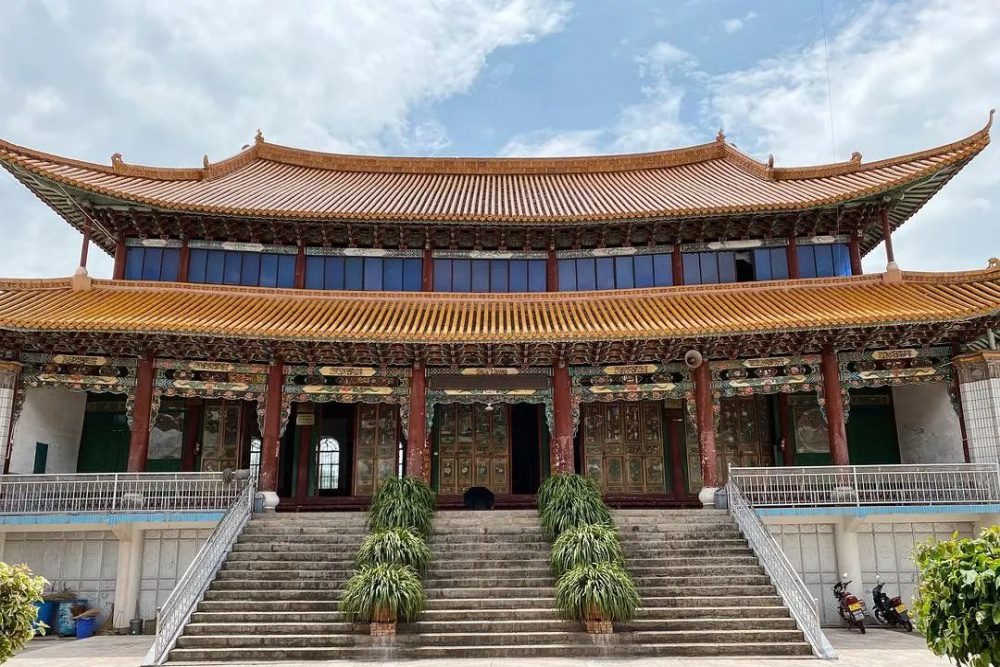Dianzhong Mosque in Weishan County, Dali
Huiying Mosque (回营清真寺) is located in Dianzhong Village (甸中村), Dacang Town (大仓镇), Weishan Yi and Hui Autonomous County (巍山彝族回族自治县), Yunnan Province (云南省). It is a key religious site for the local Hui (回族) community. The mosque was originally located in Huisanqiao Village (回双桥村), but due to historical events that led to the relocation of its original residents, the site was officially moved to its current location in 1951 with government approval.
As of 2015, the mosque had trained 31 Ahong (阿訇, Islamic clerics), one of whom had completed the Hajj pilgrimage to Mecca and earned the title of Hajji (哈吉). The mosque also operates an Arabic school (阿文学校) where 28 Manla (满拉, Islamic students) receive religious education.
The mosque was officially registered as a religious activity venue on April 18, 1997, and is currently managed by its legal representative Ma Jiawei (马加卫).
Location: Dianzhong Village (甸中村), Dacang Town (大仓镇), Weishan County (巍山县)
Established: April 18, 1997 (official registration)
Current Legal Representative: Ma Jiawei (马加卫)
Ethnic Affiliation: Hui (回族)
Religious School: Arabic School (28 Manla)
Registration Date: April 18, 1997
Historical Development
The original site of the mosque was in Huisanqiao Village (回双桥村) and was established after the Xianfeng and Tongzhi unrest (咸丰同治事变, 1856–1873) in the Qing Dynasty. Initially, it served as a place of worship for three Hui households in the area. Later, as the Hui population in the village dwindled, the mosque fell into disuse.
In 1951, with approval from the government, the architectural components of the original mosque were relocated to Dianzhong Village (甸中村) in Dacang Township (大仓乡), where it was rebuilt. The reconstructed mosque retained the original three-bay architectural layout, becoming a new religious center for the local Hui community.
Religion and Culture
As of 2015, the mosque had produced 31 Ahong, with one completing the Hajj pilgrimage and becoming a Hajji. The affiliated Arabic school consistently enrolls 28 Manla who study Islamic scriptures and religious rites.
The mosque adopts a “Han-Kou Cohabitation” (汉口共居) system, reflecting a unique form of community organization among the Hui people. This concentrated residential arrangement, locally referred to as “Huiying” (回营), is the origin of the mosque’s name.
Organization and Management
On April 18, 1997, Huiying Mosque was officially registered with the religious affairs authorities as a legal venue for religious activities. Since its registration, Ma Jiawei (马加卫) has served as the legal representative and has overseen the daily management of the mosque. As of publicly available information in 2024, the mosque has not been involved in any legal disputes or irregular operations.
Its administrative affairs are conducted through democratic consultation, upholding Islamic religious traditions while complying with the national regulations on religious affairs management.

 7 Days GolfingTour
7 Days GolfingTour
 8 Days Group Tour
8 Days Group Tour
 8 Days Yunnan Tour
8 Days Yunnan Tour
 7 Days Shangri La Hiking
7 Days Shangri La Hiking
 11 Days Yunnan Tour
11 Days Yunnan Tour
 6 Days Yuanyang Terraces
6 Days Yuanyang Terraces
 11 Days Yunnan Tour
11 Days Yunnan Tour
 8 Days South Yunnan
8 Days South Yunnan
 7 Days Tea Tour
7 Days Tea Tour
 8 Days Muslim Tour
8 Days Muslim Tour
 12 Days Self-Driving
12 Days Self-Driving
 4 Days Haba Climbing
4 Days Haba Climbing
 Tiger Leaping Gorge
Tiger Leaping Gorge
 Stone Forest
Stone Forest
 Yunnan-Tibet
Yunnan-Tibet
 Hani Rice Terraces
Hani Rice Terraces
 Kunming
Kunming
 Lijiang
Lijiang
 Shangri-la
Shangri-la
 Dali
Dali
 XishuangBanna
XishuangBanna
 Honghe
Honghe
 Kunming
Kunming
 Lijiang
Lijiang
 Shangri-la
Shangri-la
 Yuanyang Rice Terraces
Yuanyang Rice Terraces
 Nujiang
Nujiang
 XishuangBanna
XishuangBanna
 Spring City Golf
Spring City Golf
 Snow Mountain Golf
Snow Mountain Golf
 Stone Mountain Golf
Stone Mountain Golf














